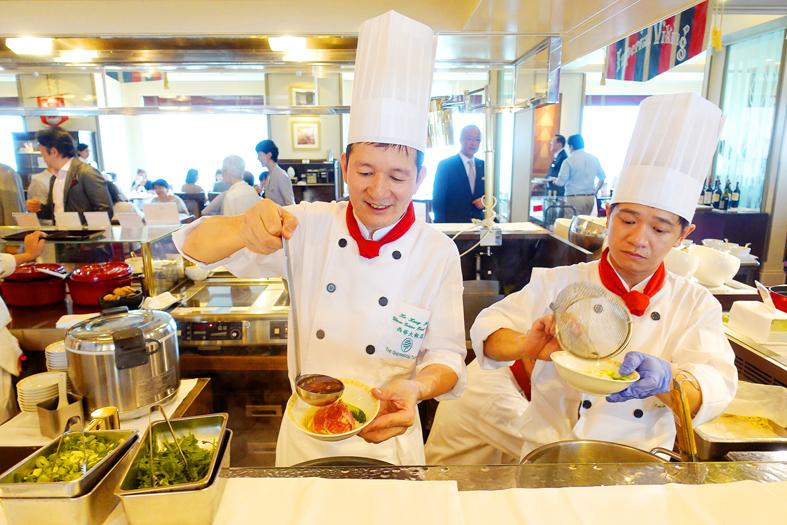The Sherwood Taipei (西華飯店) is to exit the market on Feb. 15, bowing to effects of the COVID-19 pandemic, which has wreaked havoc on lodging facilities heavily reliant on foreign business travelers.
The 320-guestroom hotel yesterday morning issued a statement to confirm the decision, which was made after it obtained preferential development terms to rebuild the 32-year-old facility on Section 3 of Minsheng E Road.
“While reluctant, the hotel arrived at the decision in light of lingering border controls and uncertainty over the virus outbreak,” the hotel said in a statement.

Photo: Lin Tsui-yi, Taipei Times
The hotel in 2020 filed an application to redevelop the premises and in November won a 40 percent award of future floor space, Sherwood Taipei board director Mark Liu (劉恆昌) told reporters.
The hotel has to halt operations to take advantage of the situation, Liu said, adding that it has not yet decided whether to develop luxury homes, office space or a mixed-use complex.
Recipients of favorable building terms must submit construction details within six months of approval.
Older facilities such as Leofoo Hotel (六福客棧) in Taipei, Ambassador Hotel Taipei (台北國賓飯店) and Taipei Fullerton Hotel East (馥敦飯店南京館) have also applied for the terms, citing similar headwinds.
International tourist hotels have been hit hard by COVID-19 restrictions, with no end in sight.
A boom in domestic tourism has been of limited benefit for facilities in Taipei, as most people prefer to vacation in southern and eastern Taiwan.
The Sherwood sits on a 1,050 ping (3,465m2) plot of land. It has 20 floors above ground and five basement levels.
Since it opened in 1990, the Sherwood Taipei has received guests of international renown such as former British prime minister Margaret Thatcher, former US president George Bush, film director Ang Lee (李安), and Hong Kong movie stars Chow Yun-fat (周潤發) and Andy Liu (劉德華).
The hotel said that its customers could stay at the Marriott Taipei (台北萬豪酒店), which is run by the same management team.
People with unused hotel and restaurant vouchers can call the Sherwood Taipei to redeem them, it said.
Hamp Court Palace
Separately, Hamp Court Palace (寶璞大飯店) in Taipei’s Zhongshan District (中山) has converted into a quarantine facility right after its opening earlier this month.
The hotel of 129 guestrooms on Jianguo North Road (建國北路) is the latest adventure of United People Co (韋樺實業), a garment and bedding retailer that recently forayed into the hospitality industry.
The company spent NT$30 million (US$1.08 million) taking over the property and plans to pour another NT$200 million renovating the facility in preparation for border reopening, it said.
The company inked a 12-year lease from the property’s owner Yu-shang Development Co (御上建設) on expectation the hospitality industry would soon emerge from the COVID-19 pandemic.
This story has been updated since it was first published to add information about Hamp Court Palace hotel.

The DBS Foundation yesterday announced the launch of two flagship programs, “Silver Motion” and “Happier Caregiver, Healthier Seniors,” in partnership with CCILU Ltd, Hondao Senior Citizens’ Welfare Foundation and the Garden of Hope Foundation to help Taiwan face the challenges of a rapidly aging population. The foundation said it would invest S$4.91 million (US$3.8 million) over three years to foster inclusion and resilience in an aging society. “Aging may bring challenges, but it also brings opportunities. With many Asian markets rapidly becoming super-aged, the DBS Foundation is working with a regional ecosystem of like-minded partners across the private, public and people sectors

BREAKTHROUGH TECH: Powertech expects its fan-out PLP system to become mainstream, saying it can offer three-times greater production throughput Chip packaging service provider Powertech Technology Inc (力成科技) plans to more than double its capital expenditures next year to more than NT$40 billion (US$1.31 billion) as demand for its new panel-level packaging (PLP) technology, primarily used in chips for artificial intelligence (AI) applications, has greatly exceeded what it can supply. A significant portion of the budget, about US$1 billion, would be earmarked for fan-out PLP technology, Powertech told investors yesterday. Its heavy investment in fan-out PLP technology over the past 10 years is expected to bear fruit in 2027 after the technology enters volume production, it said, adding that the tech would

YEAR-END BOOST: The holiday shopping season in the US and Europe, combined with rising demand for AI applications, is expected to drive exports to a new high, the NDC said Taiwan’s business climate monitor improved last month, transitioning from steady growth for the first time in five months, as robust global demand for artificial intelligence (AI) products and new iPhone shipments boosted exports and corporate sales, the National Development Council (NDC) said yesterday. The council uses a five-color system to measure the nation’s economic state, with “green” indicating steady growth, “red” suggesting a boom and “blue” reflecting a recession. “Yellow-red” and “yellow-blue” suggest a transition to a stronger or weaker condition. The total score of the monitor’s composite index rose to 35 points from a revised 31 in August, ending a four-month

RUN IT BACK: A succesful first project working with hyperscalers to design chips encouraged MediaTek to start a second project, aiming to hit stride in 2028 MediaTek Inc (聯發科), the world’s biggest smartphone chip supplier, yesterday said it is engaging a second hyperscaler to help design artificial intelligence (AI) accelerators used in data centers following a similar project expected to generate revenue streams soon. The first AI accelerator project is to bring in US$1 billion revenue next year and several billion US dollars more in 2027, MediaTek chief executive officer Rick Tsai (蔡力行) told a virtual investor conference yesterday. The second AI accelerator project is expected to contribute to revenue beginning in 2028, Tsai said. MediaTek yesterday raised its revenue forecast for the global AI accelerator used